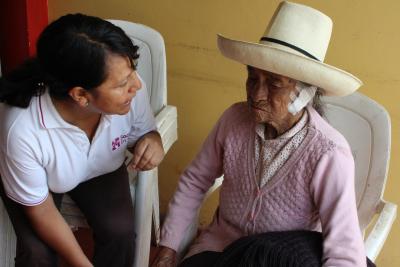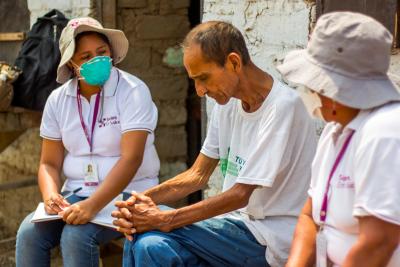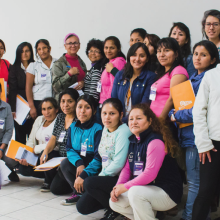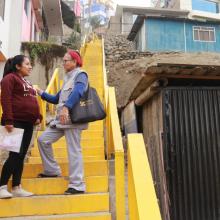Talking about mental health in older adults is still a pending debt in Peru. Every September 10, World Suicide Prevention Day reminds us that depression and suicidal ideation in older people are not only painful realities, but also an urgent challenge for the health system.
Recent figures reveal the magnitude of the problem. According to the Ministry of Health (MINSA), in 2024, 256,563 cases of depression were treated, of which 17.6% corresponded to people over 60 years of age. That same year, 735 completed suicides and 6,910 cases of self-inflicted injuries were reported. In January 2025 alone, 74 suicides and 445 self-injuries had already been reported, a sign of the persistence of this silent crisis.
On average, the country faces nine suicidal behaviors a day, and depression is present in eight out of ten cases. However, most of the affected older adults do not receive a diagnosis or timely treatment, which aggravates their vulnerability.
The population context reinforces the urgency to act. Today, more than 4 million older adults live in Peru, representing 12.7% of the national population, more than twice as many as in 1950. This rapid demographic aging requires rethinking how we care for mental health in old age and how we ensure that older people live with well-being, accompaniment and dignity.

Las personas mayores son parte de la población a la que el programa de Salud Mental de SES brinda atenciones.
Foto de SES
What is depression in older adults and how is it different?
“Depression in older adults does not always present the same as in younger people,” explains Margot Aguilar, a specialist in the Mental Health Program (SAME) at Socios En Salud. “The symptoms are usually more silent and are often confused with aging or chronic illnesses.”
Among the most common signs, Aguilar mentions apathy, loss of interest in daily activities, persistent fatigue, sleep and appetite problems, as well as physical ailments with no apparent cause. This ambiguity means that diagnosis is delayed and many people do not get the help they need.
According to the specialist, it is key to understand that depression “is not a natural part of old age.” Added to this is suicidal ideation, which can be expressed in recurrent thoughts about death, a sense of worthlessness or even planning to take one’s own life.
The most frequent risk factors at this stage include loss of a partner, reduction of support networks, deterioration of autonomy and social isolation. “Loneliness is one of the main triggers of depression and suicidal thoughts in older people,” Aguilar emphasizes.
On average, the country faces nine suicidal behaviors a day, and depression is present in eight out of ten cases.
Recommendations for preventing depression and suicide in older adults
The prevention of depression and suicidal ideation in older adults requires a comprehensive approach involving the health system, families and the community. “One of the priorities is early detection, by training primary care personnel to identify warning signs and risk behaviors,” Aguilar says.
Strengthening affective support networks is also fundamental. “The accompaniment of family members and neighbors can reduce loneliness and isolation, two of the main triggers of depression at this stage of life,” the specialist indicates. Added to this is the need to guarantee access to specialized services, from psychological care to psychiatric interventions adapted to this population.
It is also necessary to develop awareness campaigns that inform about the warning signs and the available care routes. This should be accompanied by the dissemination of help lines such as Central 113 Salud, as well as the strengthening of Community Mental Health Centers.
Finally, the Comprehensive Care Centers for the Elderly (CIAM) play a key role in promoting physical, psychological and social well-being. Reinforcing their presence in the communities will allow them to provide the elderly with safe spaces where they can receive care, accompaniment and emotional support.

El acceso a la salud mental viene fortaleciéndose en la población adulta mayor, gracias a estrategias que Socios En Salud comparte con el sistema público.
Foto de SES
What Socios En Salud does to prevent depression and suicide
In the framework of World Suicide Prevention Day, Socios En Salud reaffirms its commitment to vulnerable populations, especially older adults. Aware that this group requires specific strategies, the SAME program has implemented community interventions that combine closeness, accompaniment and scientific evidence.
One of the main ones is “Do more, feel better”, based on behavioral activation. This intervention consists of nine sessions that take place at the home of the elderly, which eliminates access barriers and ensures more humane care. The sessions are accompanied by community peer agents, older women trained to provide emotional support and facilitate adherence to the process.
“We firmly believe that older adults have the right to dignified care, adapted to their needs and focused on community accompaniment. Listening to, supporting and caring for their mental health is a collective responsibility that we reaffirm every day,” Aguilar concludes.



